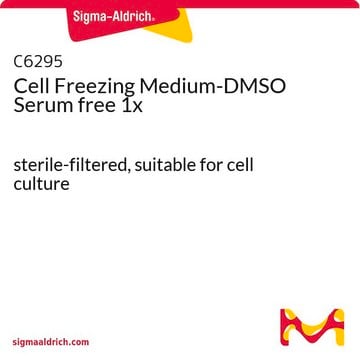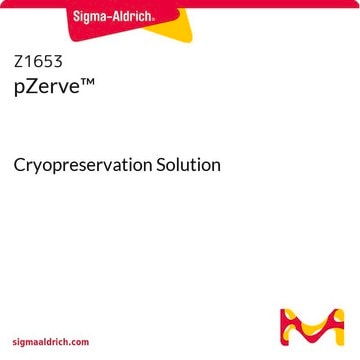SCM301
3dGRO® Organoid Freeze Medium
Optimized cryopreservation media for multiple organoids cell types.
Synonym(s):
Organoid cryopreservation medium
About This Item
Recommended Products
form
liquid
technique(s)
cell culture | stem cell: suitable
Related Categories
General description
• Similar composition and architecture to primary tissue: Organoids harbor small population of self-renewing stem cells (such as intestinal crypt stem cells) that can differentiate into cells of all major cell lineages, with similar frequency as in physiological conditions.
• Relevant models of in-vivo conditions: Organoids are more biologically relevant to any model system and are amenable to manipulate niche components and gene expression.
• Stable system for extended cultivation: Organoids can be cryopreserved as biobanks and expanded indefinitely by leveraging self-renewal and the differentiation capability of the stem cell populations.
Organoids can be cryopreserved using standard cell freezing techniques however freeze/thaw viability remains a challenge. The 3dGRO Organoid Freeze Medium is a proprietary optimized cryopreservation media for multiple organoids cell types (etc. mouse intestinal organoids, human colon and lung organoids). The media supports higher freeze/thaw viabilities compared to other commercial or homemade organoid freezing media formulations.
Application
Cell Culture
Stem Cell Research
Quality
Osmolality: 250-350 mOsm
pH: 6.8-7.1
Sterility Tested: No Growth/Pass
Bacterial & Fungal Tested: Passed
Storage and Stability
Legal Information
Disclaimer
Storage Class Code
12 - Non Combustible Liquids
WGK
WGK 3
Flash Point(F)
Not applicable
Flash Point(C)
Not applicable
Certificates of Analysis (COA)
Search for Certificates of Analysis (COA) by entering the products Lot/Batch Number. Lot and Batch Numbers can be found on a product’s label following the words ‘Lot’ or ‘Batch’.
Already Own This Product?
Find documentation for the products that you have recently purchased in the Document Library.
Articles
Human epithelial intestinal colonic organoids can be used as an alternative to Caco-2 drug permeability assays for drug screening and compound toxicity testing.
Lung organoids are valuable 3D models for human lung development and respiratory diseases. The 3dGRO™ differentiation protocol generates organoids from human iPSCs in 4 steps.
Lung organoids are valuable 3D models for human lung development and respiratory diseases. The 3dGRO™ differentiation protocol generates organoids from human iPSCs in 4 steps.
Lung organoids are valuable 3D models for human lung development and respiratory diseases. The 3dGRO™ differentiation protocol generates organoids from human iPSCs in 4 steps.
Protocols
How to stain organoids? A complete step-by-step protocol for immunofluorescent (IF) and immunocytochemical (ICC) staining of organoid cultures using antibodies
A rapid in vitro assay for CFTR function, the forskolin-induced swelling protocol uses human colon organoids, which can be derived from cystic fibrosis patient tissue.
Highly characterized cryopreserved human colonic organoids and a step-by-step organoid culture protocol for epithelial intestinal organoid differentiation from iPS cells.
Our team of scientists has experience in all areas of research including Life Science, Material Science, Chemical Synthesis, Chromatography, Analytical and many others.
Contact Technical Service






